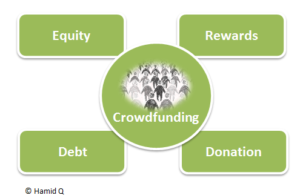Sorry startups, you actually have to be careful with equity crowdfunding disclosures. There is substantial risk of liability for securities fraud.
Based on discussions with the equity crowdfunding-curious, people seem to believe that equity crowdfunding is the wild west where anything goes. Raise lots of money and do it cheaply! Do what you want, say what you want and the SEC does not care! Look at the Form C’s, there were probably no lawyers anywhere near them. Think of the savings!!!!
Done correctly, an equity crowdfunding offering should be done with as much care as any private placement. The actual information requirements are more extensive than a typical Rule 506 offering. Most importantly, crowdfunding issuers are subject to the same liability as any other securities selling issuer.
Securities Act Section 4A(c) provides that an issuer will be liable to a purchaser of its securities in a transaction exempted by Section 4(a)(6) if the issuer, in the offer or sale of the securities, makes an untrue statement of a material fact or omits to state a material fact required to be stated or necessary in order to make the statements, in light of the circumstances under which they were made, not misleading . . .
Sound familiar? What is the difference between this liability and private placements? Equity crowdfunding is done publicly to more people who are potential claimants.
What does this mean for issuers? It means the Form C and the offering page on the platform site need to be done carefully and in compliance with SEC rules. Those rules sound a lot like watered down Regulation S-K rules for MD&A, description of securities, related party transactions, etc… If you have never complied with them, good luck doing this without experienced help.
Well, at least the platforms are safe, right? They are just dumb pipes for crowdfunding deals and have no responsibility for what the issuers do on their site, right?
Well, no. While the SEC did not impose issuer liability on the platforms, it specifically declined to exempt the platforms from liability under Section 4A(c). Why? So investors could bring suits against the platforms to make sure that the platforms take steps to keep from becoming conduits of fraud.
The SEC believes that the platforms should take steps to protect themselves. Congress provided them a defense if they could not have known of an untruth or omission in the exercise of reasonable care. In other words, the “head in the sand” defense will not work. In addition, I have seen them provide and even require standard language and provisions in their issuers Form Cs and offering pages. I doubt the SEC will ignore this if this becomes misleading.
As the SEC stated:
These steps may include establishing policies and procedure that are reasonably designed to achieve compliance with the requirements of Regulation Crowdfunding, and conducting a review of the issuer’s offering documents, before posting them to the platform, to evaluate whether they contain materially false or misleading information.
We are coming up on the one year anniversary of equity crowdfunding. It is still very early in the equity crowdfunding world to see where the liability issues will shake out. However, it is clear that the SEC and the state securities regulators take these liability issues seriously, and the issuers and platforms should too.


